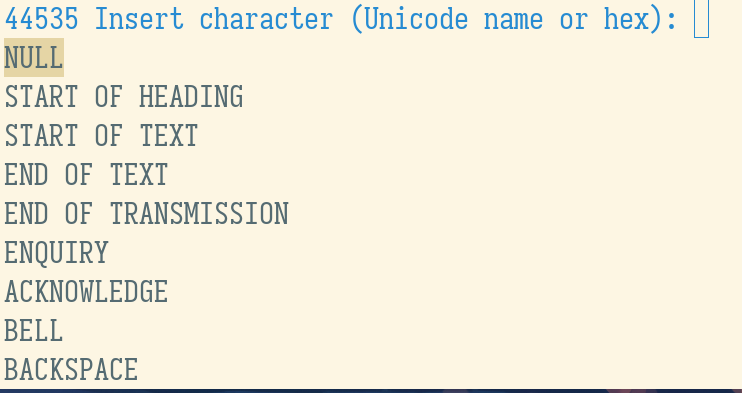键入 M-x insert-char 可以看到下面这个列表
好奇这些候选项是从哪里取的,看了下 insert-char 的源码,还是摸不着头脑
DEFUN ("insert-char", Finsert_char, Sinsert_char, 1, 3,
"(list (read-char-by-name \"Insert character (Unicode name or hex): \")\
(prefix-numeric-value current-prefix-arg)\
t))",
doc: /* Insert COUNT copies of CHARACTER.
Interactively, prompt for CHARACTER. You can specify CHARACTER in one
of these ways:
- As its Unicode character name, e.g. \"LATIN SMALL LETTER A\".
Completion is available; if you type a substring of the name
preceded by an asterisk `*', Emacs shows all names which include
that substring, not necessarily at the beginning of the name.
- As a hexadecimal code point, e.g. 263A. Note that code points in
Emacs are equivalent to Unicode up to 10FFFF (which is the limit of
the Unicode code space).
- As a code point with a radix specified with #, e.g. #o21430
(octal), #x2318 (hex), or #10r8984 (decimal).
If called interactively, COUNT is given by the prefix argument. If
omitted or nil, it defaults to 1.
Inserting the character(s) relocates point and before-insertion
markers in the same ways as the function `insert'.
The optional third argument INHERIT, if non-nil, says to inherit text
properties from adjoining text, if those properties are sticky. If
called interactively, INHERIT is t. */)
(Lisp_Object character, Lisp_Object count, Lisp_Object inherit)
{
int i, stringlen;
register ptrdiff_t n;
int c, len;
unsigned char str[MAX_MULTIBYTE_LENGTH];
char string[4000];
CHECK_CHARACTER (character);
if (NILP (count))
XSETFASTINT (count, 1);
else
CHECK_FIXNUM (count);
c = XFIXNAT (character);
if (!NILP (BVAR (current_buffer, enable_multibyte_characters)))
len = CHAR_STRING (c, str);
else
str[0] = c, len = 1;
if (XFIXNUM (count) <= 0)
return Qnil;
if (BUF_BYTES_MAX / len < XFIXNUM (count))
buffer_overflow ();
n = XFIXNUM (count) * len;
stringlen = min (n, sizeof string - sizeof string % len);
for (i = 0; i < stringlen; i++)
string[i] = str[i % len];
while (n > stringlen)
{
maybe_quit ();
if (!NILP (inherit))
insert_and_inherit (string, stringlen);
else
insert (string, stringlen);
n -= stringlen;
}
if (!NILP (inherit))
insert_and_inherit (string, n);
else
insert (string, n);
return Qnil;
}
